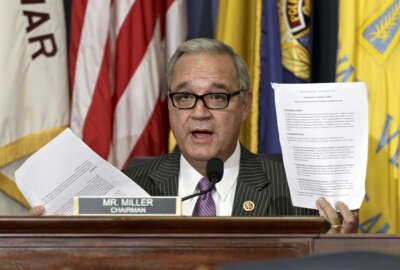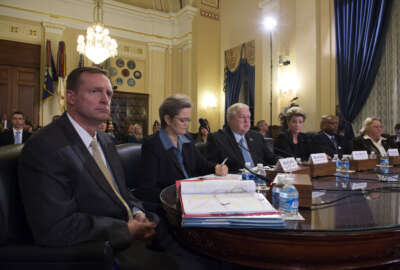
Congress skeptical of VA’s $5 million payouts to settle employee disciplinary cases
The Veterans Affairs Department paid roughly $5 million to some employees to settle disciplinary actions, according to House VA Committee Chairman Jeff Miller...
The Veterans Affairs Department paid its employees and their attorneys more than $5 million to settle disciplinary action disagreements and avoid litigation between July 2014 and the present.
A congressional inquiry from House Veterans Affairs Committee Chairman Jeff Miller (R-Fla.) found VA used employee settlement agreements 208 times during that same time period. The department used monetary payouts to settle 72 percent of those cases, with the average settlement totaling $24,305.
VA insists its use of employee settlement agreements is in line with other agencies, and department managers are using “proper and critical” tools to close employee cases in the most cost-effective and least disruptive way.
But Congress is skeptical that VA is overusing settlements, and it fears the department may use settlement agreements to silence some whistleblowers.
“In theory, I think these agreements are useful tools to avoid lengthy administrative or legal processes, but it is clear that the potential overuse of these agreements stems from burdensome civil service laws that make it difficult for VA managers to appropriately discipline VA employees,” Miller said during a Sept. 14 committee hearing.
“I also wonder what type of message that VA is sending to other good employees when they allow bad employees to settle for thousands of dollars just because it would be too expensive or embarrassing to litigate,” he added.
VA managers work with the department’s lawyers to review what risks they may encounter if they decide to litigate the case with the employee, said Leigh Bradley, general counsel for VA. Then, they’ll consider how much that litigation might cost and how it might impact the immediate VA workforce.
“This is a key business decision,” she said. “That will include the administrative resources to investigate and process a complaint, loss of employee productivity during deposition and trial testimony, deposition and transcript costs, and, if VA does not prevail, payment of compensatory damages, back pay, interest and attorney fees.”
Prohibited personnel complaints from VA employees to the Office of Special Counsel have increased by 67 percent since 2013. OSC is also currently reviewing 300 VA whistleblower cases and has delivered 169 favorable actions for employees in the past two years.
VA became the first agency to become certified in OSC’s whistleblower procedures and process, said Eric Bachman, deputy special counsel for litigation and legal affairs at OSC.
VA and OSC both said the rise in the number of personnel and whistleblower cases shows a positive sign that more department employees feel comfortable to come forward and speak out. For Bradley, it’s also a sign that VA leaders are in fact building “a culture of accountability.”
But the committee is concerned the department is using employee settlements to pay off or silence whistleblowers. Bradley said she didn’t believe VA had that problem but didn’t give an answer with certainty.
“I don’t want to say there is no problem,” Bradley said. “I think we’re making a significant culture change, and culture change is hard and it takes a long time. It’s incumbent upon every leader to be asking that kind of question. Are we taking the easy way out here?”
Bradley said the department’s human resources and administration office is beginning to develop a data analytics tool to help managers.
“It’s really using data analytics to be able to give leaders better intelligence about what’s happening at their facility or group of facilities. It’s going to give in concrete terms some ideas about how many complaints have been raised or lodged at this particular facility over some period of time. How many of those cases were settled? What’s the cost of settlement? This is going to give us some ability to see where we might have problems with leaders or we might a culture that is not conducive to a high performing workforce.”
VA should roll out the new tool in November, Bradley said.
A better understanding of how individual medical centers and leaders are using settlement agreements is welcome, the committee said, because VA does not have a departmentwide policy for using or keeping track of employee settlements.
In most cases, individual medical center leaders decide — with legal counsel — whether it should use a settlement to close a disciplinary case with an employee.
“We have longstanding practices of how we work together to evaluate each individual case on its merits,” Bradley said. “That’s done in close consultation with lawyers. In unusual cases, that’s done in close consultation with lawyers in the [VA] central office.”
Funding for each settlement agreement comes from the individual medical center’s operating budget. VA is attuned to each of these settlement agreements, Bradley said, because the department’s funding is precious.
But some members of the committee said the emphasis on time and money when holding VA employees accountable is the wrong approach.
“It seems as those in this settlement practice there is a focus on time and money, and I understand that,” Rep. Julia Brownley (D-Calif.) said. “I understand that on one level. But it seems like that’s the emphasis rather than the principle and the accountability. You’re not going to get to the cultural shifts and changes that need to really permeate deep into the organization unless we are focused more on the principle and the accountability.”
Copyright © 2025 Federal News Network. All rights reserved. This website is not intended for users located within the European Economic Area.
Nicole Ogrysko is a reporter for Federal News Network focusing on the federal workforce and federal pay and benefits.
Follow @nogryskoWFED
Related Stories





